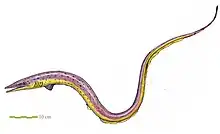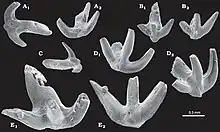| Thrinacodus Temporal range: Late Devonian-Lower Carboniferous | |
|---|---|
 | |
| Restoration of T. gracia | |
 | |
| Teeth of T. dziki | |
| Scientific classification | |
| Domain: | Eukaryota |
| Kingdom: | Animalia |
| Phylum: | Chordata |
| Class: | Chondrichthyes |
| Subclass: | Elasmobranchii |
| Clade: | †Phoebodontiformes |
| Genus: | †Thrinacodus St. John and Worthen, 1875 |
| Species | |
| |
| Synonyms | |
| |
Thrinacodus is an extinct genus of basal elasmobranch, found worldwide from the Late Devonian-Lower Carboniferous. Most species are only known from their tricuspid teeth. T. gracia, originally placed in the separate genus Thrinacoselache from the Serpukhovian-aged Bear Gulch Limestone, of what is now Montana, is known from full body impressions, showing a long, slender eel-like body up to a metre in length, with an elongate rostrum.[1][2][3] Stomach contents of T. gracia include remains of crustaceans and small chondrichthyan fish (Harpagofututor and Falcatus).[1] It is a member of the Phoebodontiformes.[3]
References
- 1 2 Grogan, Eileen D.; Lund, Richard (2008). "A basal elasmobranch, Thrinacoselache gracia n. gen and sp., (Thrinacodontidae, new family) from the Bear Gulch Limestone, Serpukhovian of Montana, USA". Journal of Vertebrate Paleontology. 28 (4): 970–988. doi:10.1671/0272-4634-28.4.970. S2CID 84735866.
- ↑ Ginter, Michał; Turner, Susan (2010-12-02). "The middle Paleozoic Selachian genus Thrinacodus". Journal of Vertebrate Paleontology. 30 (6): 1666–1672. doi:10.1080/02724634.2010.520785. ISSN 0272-4634. S2CID 86058786.
- 1 2 Frey, Linda; Coates, Michael; Ginter, Michał; Hairapetian, Vachik; Rücklin, Martin; Jerjen, Iwan; Klug, Christian (2019-10-09). "The early elasmobranch Phoebodus: phylogenetic relationships, ecomorphology and a new time-scale for shark evolution". Proceedings of the Royal Society B: Biological Sciences. 286 (1912): 20191336. doi:10.1098/rspb.2019.1336. ISSN 0962-8452. PMC 6790773. PMID 31575362.
This article is issued from Wikipedia. The text is licensed under Creative Commons - Attribution - Sharealike. Additional terms may apply for the media files.